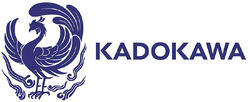- Disclaimer: Daiei Co., Ltd., Daiei Film Co., Ltd. and the Kadokawa Corporation are three separate companies. They are covered together for convenience.
Daiei Co., Ltd. (大映株式会社 Daiei Kabushikigaisha?) was a Japanese film studio, founded in 1942 as a conglomerate of Shinko Kinema, Daito Film and Nikkatsu. The company produced various kaiju and tokusatsu films until its bankruptcy in 1971, most notably the Gamera and Yokai Monsters series. The company consisted of two studios, Daiei Kyoto Studio (大映京都撮影所 Daiei Kyōtō Satsueijo?) and Daiei Tokyo Studio (大映東京撮影所 Daiei Tōkyō Satsueijo?), which produced movies independently. Daiei was acquired by Tokuma Shoten, who reestablished the company as Daiei Film Co., Ltd. (大映映画株式会社 Daiei Eiga Kabushikigaisha?) in 1974.
History[]

Daiei Logo
Founded in 1942 as Dai Nippon Film Co., Ltd., the studio went bankrupt in 1971. In 1974 it was bought by Tokuma Shoten; and in 2002 was sold to Kadokawa Shoten and renamed Kadokawa Daiei Motion Picture Co., Ltd., later Kadokawa Pictures. In March 2004, Kadokawa Pictures acquired a 44% stake in Nippon Herald Films; and acquired the remaining 56% stake the following year. [1][2] On March 1 2006 it merged with the Kadokawa Herald to become Kadokawa Herald Pictures, Inc.
One of the greatest studios in Japan, they are best known for having produced the giant monster Gamera film series, and the Daimajin Trilogy. They also produced the Zatoichi film series and the television series Shōnen Jet.
Popularity[]
in the early 1950s Daiei Began fame for there drama films Rashomon (1950), Ugetsu (1953), Gate of Hell (1953) and Sansho the Bailiff (1954) and later regained in the 1960s when the Gamera and Zatoichi film series's where made.
Bankruptcy[]
Suffering from Nagata's profligacy and an industry-wide decline in attendance, Daiei tried to stay alive by teaming up with Nikkatsu, but eventually declared bankruptcy in December 1971. Members of the union, however, succeeded in getting Yasuyoshi Tokuma, the president of the publishing house Tokuma Shoten, to revive the company in 1974.[1] The company continued as a producer making only a small number of films, some of which were big budget spectaculars like the international co-production The Go Masters (1982), a new Gamera trilogy (1995, 1996 and 1999), art house hits like Shall We Dance? (1996), and genre films like Kiyoshi Kurosawa's Pulse or Takashi Miike's Dead or Alive films.
Selected Productions[]
- Main article: List of Daiei tokusatsu Productions
See also[]
- Dainichi Film
- Toho
- Toei
References[]
External links[]
- Company website
- Kadokawa Pictures at the Internet Movie Database

